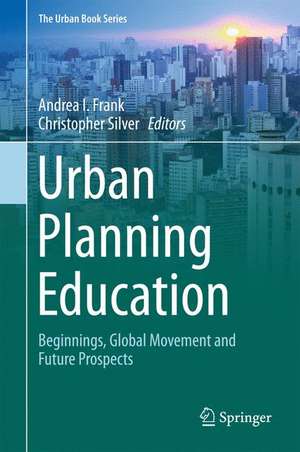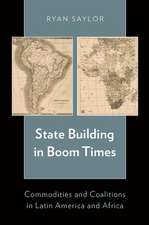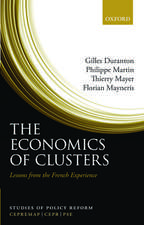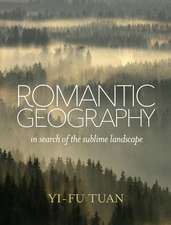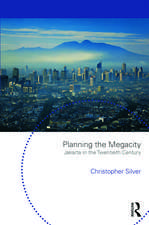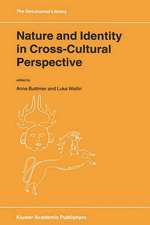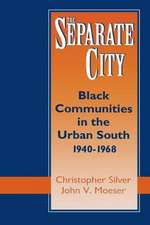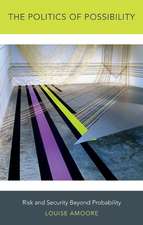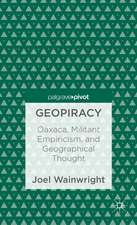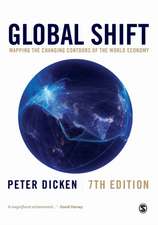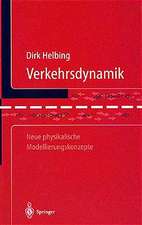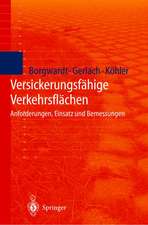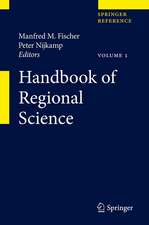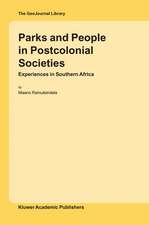Urban Planning Education: Beginnings, Global Movement and Future Prospects: The Urban Book Series
Editat de Andrea I. Frank, Christopher Silveren Limba Engleză Hardback – 24 iul 2017
The first part of this volume focuses on the emergence of planning education programs in the twentieth century as a way to understand the current planning education environment. Then we explore how education in urban, regional and spatial planning has developed in different ways in different countries and continents. The final part of this volume aims to envision how planning can adapt and develop to remain relevant to the development of human environments in the 21st century. Urban planning education has become a pervasive practice throughout the world as urbanization and development pressures have increased over the past half century, and as demand increased for professional trained experts to guide those processes. The approaches vary widely, based in part upon the discipline from which the planning program developed as well as the context-specific challenges within the country or region where the program resides.
| Toate formatele și edițiile | Preț | Express |
|---|---|---|
| Paperback (1) | 795.30 lei 38-44 zile | |
| Springer International Publishing – 13 mai 2018 | 795.30 lei 38-44 zile | |
| Hardback (1) | 804.03 lei 38-44 zile | |
| Springer International Publishing – 24 iul 2017 | 804.03 lei 38-44 zile |
Din seria The Urban Book Series
- 15%
 Preț: 655.27 lei
Preț: 655.27 lei - 15%
 Preț: 640.06 lei
Preț: 640.06 lei - 15%
 Preț: 643.16 lei
Preț: 643.16 lei - 18%
 Preț: 1007.35 lei
Preț: 1007.35 lei - 15%
 Preț: 648.56 lei
Preț: 648.56 lei - 18%
 Preț: 1003.38 lei
Preț: 1003.38 lei - 15%
 Preț: 642.18 lei
Preț: 642.18 lei - 18%
 Preț: 963.15 lei
Preț: 963.15 lei - 18%
 Preț: 948.92 lei
Preț: 948.92 lei - 15%
 Preț: 649.87 lei
Preț: 649.87 lei - 18%
 Preț: 731.59 lei
Preț: 731.59 lei - 18%
 Preț: 783.50 lei
Preț: 783.50 lei - 18%
 Preț: 894.46 lei
Preț: 894.46 lei - 18%
 Preț: 897.02 lei
Preț: 897.02 lei - 15%
 Preț: 648.24 lei
Preț: 648.24 lei - 18%
 Preț: 949.42 lei
Preț: 949.42 lei - 18%
 Preț: 731.10 lei
Preț: 731.10 lei - 15%
 Preț: 649.87 lei
Preț: 649.87 lei - 15%
 Preț: 639.37 lei
Preț: 639.37 lei - 18%
 Preț: 950.52 lei
Preț: 950.52 lei - 15%
 Preț: 644.95 lei
Preț: 644.95 lei - 15%
 Preț: 640.06 lei
Preț: 640.06 lei - 18%
 Preț: 1126.52 lei
Preț: 1126.52 lei - 15%
 Preț: 645.60 lei
Preț: 645.60 lei - 15%
 Preț: 649.87 lei
Preț: 649.87 lei - 18%
 Preț: 1415.66 lei
Preț: 1415.66 lei - 15%
 Preț: 647.73 lei
Preț: 647.73 lei - 18%
 Preț: 793.32 lei
Preț: 793.32 lei - 18%
 Preț: 892.90 lei
Preț: 892.90 lei - 15%
 Preț: 659.70 lei
Preț: 659.70 lei - 18%
 Preț: 1004.99 lei
Preț: 1004.99 lei - 15%
 Preț: 645.79 lei
Preț: 645.79 lei - 18%
 Preț: 735.84 lei
Preț: 735.84 lei - 20%
 Preț: 564.40 lei
Preț: 564.40 lei - 18%
 Preț: 892.90 lei
Preț: 892.90 lei - 18%
 Preț: 952.09 lei
Preț: 952.09 lei - 15%
 Preț: 641.71 lei
Preț: 641.71 lei - 18%
 Preț: 1009.70 lei
Preț: 1009.70 lei - 18%
 Preț: 1401.61 lei
Preț: 1401.61 lei - 18%
 Preț: 1109.16 lei
Preț: 1109.16 lei - 15%
 Preț: 648.24 lei
Preț: 648.24 lei - 18%
 Preț: 726.37 lei
Preț: 726.37 lei - 18%
 Preț: 728.28 lei
Preț: 728.28 lei - 18%
 Preț: 894.46 lei
Preț: 894.46 lei - 18%
 Preț: 1000.24 lei
Preț: 1000.24 lei - 15%
 Preț: 640.06 lei
Preț: 640.06 lei - 18%
 Preț: 998.66 lei
Preț: 998.66 lei - 15%
 Preț: 657.90 lei
Preț: 657.90 lei
Preț: 804.03 lei
Preț vechi: 1057.93 lei
-24% Nou
153.85€ • 161.04$ • 128.05£
Carte tipărită la comandă
Livrare economică 27 martie-02 aprilie
Specificații
ISBN-10: 3319559664
Pagini: 481
Ilustrații: XV, 345 p. 24 illus., 8 illus. in color.
Dimensiuni: 155 x 235 mm
Greutate: 0.75 kg
Ediția:1st ed. 2018
Editura: Springer International Publishing
Colecția Springer
Seria The Urban Book Series
Locul publicării:Cham, Switzerland
Cuprins
and path-dependency.- Planning education in Bangladesh.- The roles of planning education in the decentralization & democratization era: lessons from Indonesia.- Section III – charting future trends.- Envisioning the future of planning and planning education.- Educational partnerships for innovation in communities (EPIC): harnessing university resources to create change.- The collaborative interdisciplinary studio.- Planning education with and through technologies.- Educating code-switchers in a post-sustainability world.- Are planning programs delivering what planning students need? perspectives on planning education from practitioners.- Conclusion.
Recenzii
Notă biografică
Christopher Silver, FAICP is Professor of Urban and Regional Planning at the University of Florida, whose areas of teaching include international development planning, planning history and sustainable urbanism. He also has held academic and administrative appointments at Virginia Commonwealth University from 1979 to 1998 and the University of Illinois, 1998-2006. He served for three years as urban development advisor to Indonesia under a U.S. Agency for International Development project. His international experience in Indonesia began in 1989 with a Fulbright Senior Lectureship at the University of Indonesia, and continued with two subsequent Fulbright scholarships in 1992 and 2004 at the Institute of Technology Bandung, Indonesia. He has spent over 20 years researching urban development and decentralization in that country. He is author or co-author of five books, including Planning the Megacity:
Jakarta, Indonesia in the Twentieth Century (Routledge, 2008) and Planning and Decentralization: Contested Spaces for Action in the Global South, with V. Beard and F. Miraftab (Taylor & Francis, 2008) as well as numerous articles, chapters, book reviews, paper presentations and speeches. He is currently completing a monograph tentatively entitled, Four Centuries of Water Management in Jakarta: Toward Sustainability in a Megacity. He has held major positions in several national professional organizations, previously as co-editor of the Journal of the American Planning Association and founding editor (2001 – 2016) of the Journal of Planning History, and President of the Association of Collegiate Schools of Planning and the Society for American City and Regional Planning.
Textul de pe ultima copertă
The first part of this volume focuses on the emergence of planning education programs in the twentieth century as a way to understand the current planning education environment. Then we explore how education in urban, regional and spatial planning has developed in different ways in different countries and continents. The final part of this volume aims to envision how planning can adapt and develop to remain relevant to the development of human environments in the 21st century. Urban planning education has become a pervasive practice throughout the world as urbanization and development pressures have increased over the past half century, and as demand increased for professional trained experts to guide those processes. The approaches vary widely, based in part upon the discipline from which the planning program developed as well as the context-specific challenges within the country or region where the program resides.
Caracteristici
Descriere
This book examines planning education provision and approaches globally, through a comparative and longitudinal perspective. It explores the emergence of planning education in the 20th century, with its rich variation and yet a remarkable degree of cross-fertilization. Each of the sections of the book is framed by an overview essay which has been prepared by the editors to provide the reader with a critical exposure to relevant scholarship drawing on the detailed case studies and exploratory essays on key issues in planning education.
The first part of this volume focuses on the emergence of planning education programs in the twentieth century as a way to understand the current planning education environment. Then we explore how education in urban, regional and spatial planning has developed in different ways in different countries and continents. The final part of this volume aims to envision how planning can adapt and develop to remain relevant to the development of human environments in the 21st century. Urban planning education has become a pervasive practice throughout the world as urbanization and development pressures have increased over the past half century, and as demand increased for professional trained experts to guide those processes. The approaches vary widely, based in part upon the discipline from which the planning program developed as well as the context-specific challenges within the country or region where the program resides.
